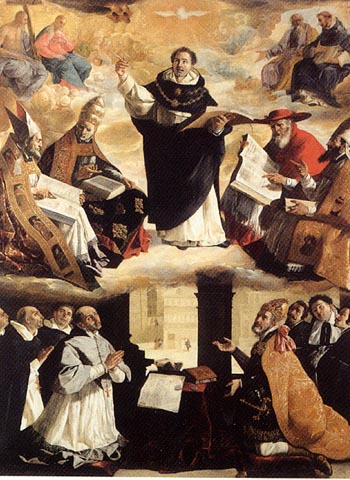
Aquinas: The Treatise on Law Qu. 90. The Essence of Law
2. Is the law always directed towards the Common Good? A: Every part is ordered to the whole as the imperfect to the perfect. The individual is part of a perfect whole that is the community. Therefore, law must concern itself in particular with the happiness of the community.
Many may decry Aquinas of proposing Communism. This would be a rather unfortunate rendering of what he had to say. He was far more concerned with law than economics, and he saw community in the form of a commonwealth rather than a communitarian utopia. He was, after all, quite aware of the flaws of man and the reality of inequality.
While many may wish to toss Aquinas to the wind, I think America would do well to consider his insight. There was a time when America understood the idea of a commonwealth. There was a time when America understood the idea of a nation. To be quite frank, there was once a time when America knew what America was! All of this has fallen to the wayside. Americanism - not the heresy - has become as elusive as a three-legged ballerina. To say that this is a tragedy would be a gross understatement.
America must regain its sense of identity. This requires common heritage, common traditions, a common religion, and common values. It takes Americans realizing, and accepting, that while the promises of "you can do anything you want" are nothing more than empty platitudes, they can most certainly do what they do best. And only they know what this is and how this is to be done.
But it is here where the individual and the common meet. It is here where we find a tension between what is good for the one and good for the many. This has been the trial of our times. Thankfully, we are not left to wander on our own. Those who came before us faced the same questions, and dealt with them in ways that we shouldn't take for granted.
These saints and sinners balanced out these two extremes with an archaic form of fusionism. On the one hand, they insisted on private property. On the other hand, they wished for the owner to feel a familial commitment to those around him. Likewise, they saw in man the right to elect a statesman. Still, they held them accountable to the wellbeing of the commonwealth. They also saw man's desire to pursue happiness as a great goal to be achieved. But they never mistook liberty for license. It was a balancing act, but one they did fairly well.
The cult of radical diversity, led by the Diversicrat ayatollahs, is tearing this country apart at the seams. Laissez faire tolerance of moral deviancy is eating away at our culture. It is long overdue for the people to rise up, to stand for God and country, and fight back the tide of degeneracy dominating this once great nation. Until we can balance our cultural institutions upon the tightrope of the one and the many, we will continue down this road. Unfortunately, this road is one that has been traveled by all great empires that once were but are no more.
2. Is the law always directed towards the Common Good? A: Every part is ordered to the whole as the imperfect to the perfect. The individual is part of a perfect whole that is the community. Therefore, law must concern itself in particular with the happiness of the community.
Many may decry Aquinas of proposing Communism. This would be a rather unfortunate rendering of what he had to say. He was far more concerned with law than economics, and he saw community in the form of a commonwealth rather than a communitarian utopia. He was, after all, quite aware of the flaws of man and the reality of inequality.
While many may wish to toss Aquinas to the wind, I think America would do well to consider his insight. There was a time when America understood the idea of a commonwealth. There was a time when America understood the idea of a nation. To be quite frank, there was once a time when America knew what America was! All of this has fallen to the wayside. Americanism - not the heresy - has become as elusive as a three-legged ballerina. To say that this is a tragedy would be a gross understatement.
America must regain its sense of identity. This requires common heritage, common traditions, a common religion, and common values. It takes Americans realizing, and accepting, that while the promises of "you can do anything you want" are nothing more than empty platitudes, they can most certainly do what they do best. And only they know what this is and how this is to be done.
But it is here where the individual and the common meet. It is here where we find a tension between what is good for the one and good for the many. This has been the trial of our times. Thankfully, we are not left to wander on our own. Those who came before us faced the same questions, and dealt with them in ways that we shouldn't take for granted.
These saints and sinners balanced out these two extremes with an archaic form of fusionism. On the one hand, they insisted on private property. On the other hand, they wished for the owner to feel a familial commitment to those around him. Likewise, they saw in man the right to elect a statesman. Still, they held them accountable to the wellbeing of the commonwealth. They also saw man's desire to pursue happiness as a great goal to be achieved. But they never mistook liberty for license. It was a balancing act, but one they did fairly well.
The cult of radical diversity, led by the Diversicrat ayatollahs, is tearing this country apart at the seams. Laissez faire tolerance of moral deviancy is eating away at our culture. It is long overdue for the people to rise up, to stand for God and country, and fight back the tide of degeneracy dominating this once great nation. Until we can balance our cultural institutions upon the tightrope of the one and the many, we will continue down this road. Unfortunately, this road is one that has been traveled by all great empires that once were but are no more.






